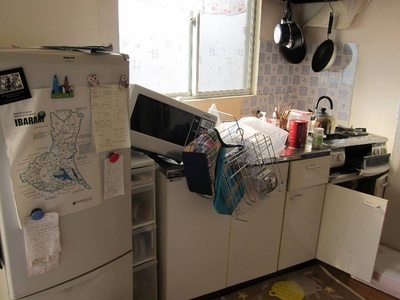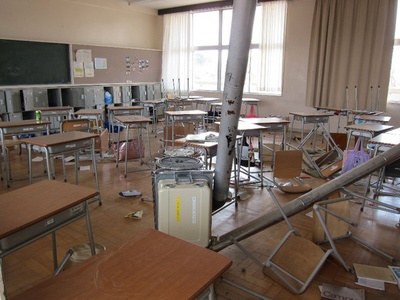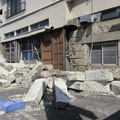Read Part 2 >>
Monday, March 14th
Monday morning we woke up early to get to the bus. The first bus was leaving at 9:20 a.m., but it was first come, first served. On Sunday, we saw people arriving two hours ahead of time, so we arrived early to secure our seats. I went up to the front desk to get my cell phone that they had been charging for me and a staff member handed me an article and a note. He told me rolling blackouts would be starting that day and the Tsukuba Express train that we would be taking would be affected. He had written down the times it would not be running and printed an article about the blackouts in English. I thanked him and all the hotel staff for their wonderful care over the past few days. They truly did their best to provide for their guests, despite the circumstances. I asked about payment and they said we did not have to pay since they weren't able to provide us with comfortable rooms. We left the room that had become our temporary home for the past few days and added our comforters to the large pile in the lobby.
We were one of the first people on the bus and found out the bus was leaving at 8:00 a.m., an hour and a half earlier than scheduled. It would take about two hours to get to Tsukuba and the rolling blackouts were set to start at 10:30 a.m. I think they moved up the time to get people into Tsukuba before the blackouts started. As we got off the bus in Tsukuba a man asked us if we were going into Tokyo. I told him we were headed to the airport and planned to take a bus or taxi to our hotel from there. He said there were buses going to Narita from Tsukuba. We found the bus stop for Narita and waited in line with many other people. When the bus arrived, I discovered we needed reservations and did not have any. We stepped into a standby line and waited anxiously to see if there would be room for us. There was a group of four in front of us and we prayed there would be space. There ended up being space for five more people, so the group of four made it onto the bus. My friends and I and the rest of the people in our line were told that we could wait on standby for the next bus, but they couldn't guarantee us seats.
We decided to take the train and got off a few stops before the end of the line only to find the next station closed because of the blackouts. So we got back on the train and rode it until the end of the line. It was a race against time because we knew the trains would be stopping soon. I called a friend in Chiba to see if she knew what the train situation was like in Tokyo. She told me trains in Tokyo were stopped and wouldn't be running again until the evening. After a hectic morning, we finally made it into Tokyo. We had no choice but to take a taxi to our hotel. Our hotel was in Chiba, outside of Tokyo, not far from the airport. It ended up being the most expensive taxi ride of my life, but my friends and I were relieved to finally be at the hotel! We checked into our room, exhausted from the stress and travel of the day.
Tuesday, March 15th
We took the first shuttle from our hotel to the airport early Tuesday morning. The check in line was really long, but luckily it moved quickly. My friends checked in for their flight and got their boarding tickets. I was relieved that we had made it to the airport after not knowing for so long. I was sad to see them go, but happy they were finally able to get back to Chicago. We said our goodbyes and I began my search for water and internet. My plan that day was to go back to Tsukuba to stay with a friend. I bought my bus ticket and from Tsukuba planned to meet up with another friend to drive north to get my passport from my apartment for Cambodia.
All that changed after reading an email and receiving a text from a friend living in Ibaraki. There was concern that radiation had been released into the atmosphere and people were being advised to stay indoors. My friend strongly advised me not to go to Tsukuba and to stay in the Tokyo/Narita area. She told me I could stay with someone she knew in Chiba who lived close to the airport. So, I made the decision to return my bus ticket and stay with her friend. Thankfully, the train I needed to use was working and I only needed to take it one stop. After a short train and taxi ride, I arrived in Chiba.
I stayed in Chiba for about two weeks with my new friend who had all her lifelines- electricity, water and food. It was comforting to be with someone during such uncertain times. While the rolling blackouts affected many parts of Tokyo, her condo didn’t have any power outages! We made frequent trips to the grocery store and it was strange to see so many shelves stocked with food. Chiba didn’t seem to have a lot of damage compared to what I saw in Mito.
I ended up canceling my trip to Cambodia because I was not able to get my passport in time. Transportation was at a standstill for awhile because the train tracks and main highway going north were badly damaged. I was disappointed, but was able to rest and enjoy my time in Chiba.
As for teaching, the end of March was spring vacation and the new school year starts in April. I decided to return to my apartment in Takahagi during the last week of March to assess the damage in my apartment and go into school. Workers had repaired the highway and I was able to take a bus north.
The earthquake made many things fall in my apartment - my microwave, tv, bookshelf, papers etc. My kitchen sink and stove unit, china cabinet and refrigerator were moved. My microwave and tv broke, but besides that my apartment was just messy. I cleaned for about three days and left many big objects on the floor.
There was damage at all of my schools, a lot of cracks and broken bookshelves and chunks of the wall missing. At one of my school, the roof of the gym collapsed. Thankfully, all the students and teachers at my schools were okay. After an extended break, the new school year officially started on April 11th. I am back at school too and it is nice to see the students again and their smiles and laughter inspire me to stay positive. I have been impressed with the spirit of the Japanese people during this crisis, people and communities working together to help each other. The road ahead is filled with uncertainty with aftershocks continuing for up to a year and unstable conditions at the Fukushima nuclear plant. Despite this, I plan to stay in Japan, which has become a second home to me for at least another year. I am able to say this with confidence because I know God is with me and has been every step of the way.
*This article was originally published in Voices of Chicago, online journal of the Chicago Japanese American Historical Society on April 29, 2011.
© 2011 Kristin Hanaoka







